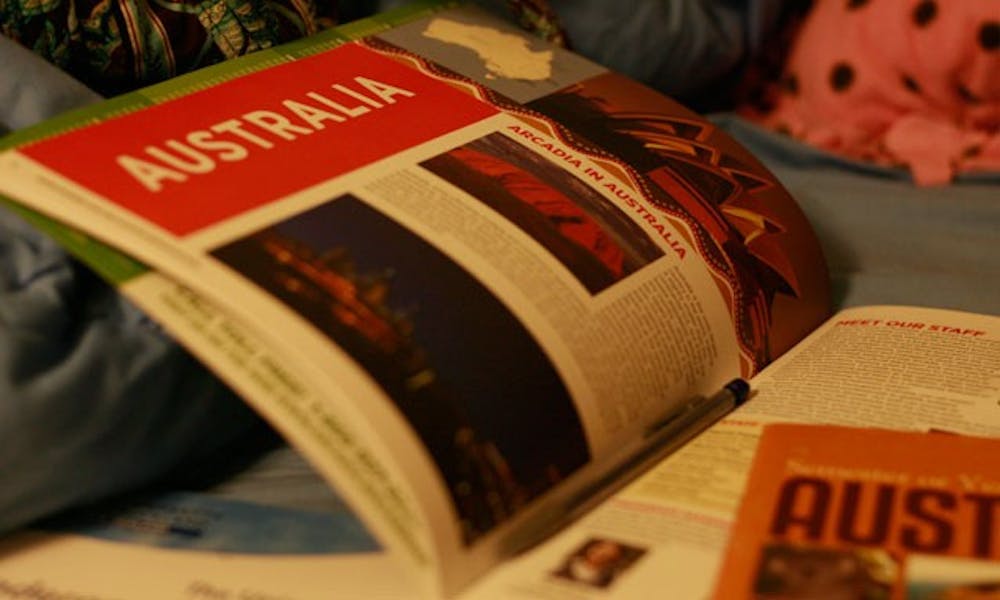As application deadlines for study abroad programs loom, many Trinity students may find that their Pratt counterparts are looking to go abroad—a trend somewhat unique to Duke.
Although the Pratt School of Engineering has a higher study abroad rate than other engineering institutions across the nation, some Duke engineers are finding their globe-trotting ambitions handicapped by the demands of their curriculum.
According to the most recent statistics, about 31 percent of engineers in the Class of 2010 studied abroad, as compared to 47 percent of their Trinity College of Arts and Sciences counterparts. Although engineering students noted that finding study abroad opportunities is not much more difficult than the process is for Trinity students, many said finding abroad programs that offer engineering courses and that do not have language requirements can be challenging.
“I think that there is just more flexibility in the Trinity curriculum and that enables Arts and Science majors to study abroad—let’s say more spontaneously—than the typical engineering student, who must think about it and plan ahead about a year or more in advance,” Linda Franzoni, Pratt associate dean for undergraduate education, wrote in an e-mail.
Although fewer Pratt students study abroad in comparison to Trinity students, Margaret Riley, director of the Global Education Office for Undergraduates, noted that more engineers at Duke study abroad than peer engineers across the nation. Nationally, 3.2 percent of engineering undergraduates study abroad—just one-tenth of Pratt’s study abroad rate.
“One of the reasons that I chose Duke’s engineering school was that I knew many Pratt engineers have the opportunity to study abroad,” said junior Amanda Britt, who studied in France in the Fall.
In fact, the number of Pratt students choosing to study abroad has increased almost three-fold over a 10-year period. In the 1999-2000 academic year, 32 Duke engineers took courses abroad, whereas 92 engineers went abroad in 2009-2010. Riley said that Pratt established a study abroad committee in 2001 to approve courses and recommend abroad programs tailored for engineers.
“We have approved programs specifically to make more alternatives available for engineers,” Riley said. “We were not given specific funds to use in these efforts, but... establishing this as an office priority allowed us to do what we needed to do in order to fund our efforts.”
Some engineers, however, said that barriers still exist to studying abroad. Many said that Pratt’s core major requirements do not allow them the flexibility to spend a semester abroad, and others noted that potential language barriers could be a hindrance. Pratt does not have a foreign language requirement in its curriculum.
“From an engineer’s standpoint, if you go to a country where English is the native language you don’t have to take classes in a foreign language, which was attractive to me because I haven’t taken any foreign languages since high school,” said sophomore Jack Frush, who hopes to study abroad at the University of New South Wales next Fall.
The two most popular study abroad programs for engineers are offered at the University of New South Wales in Sydney, Australia and at Queen Mary, University of London, Riley said. Pratt Dean Tom Katsouleas added that engineers can study abroad through many other Duke-approved programs.
Although most Pratt students choose to study abroad through those non-Duke administered, but approved programs, Franzoni said the University has worked to establish Duke-administered programs in non-English speaking countries that cater to engineers. Duke in Berlin, for instance, offers an engineering track that runs in the Spring and during part of the summer. The program includes an intensive German for engineers course, but allows students to take up to two engineering courses while abroad.
Duke is also looking into establishing engineering programs at other international locations.
“Duke in Madrid is another example of a program where Global Ed is working with our office to try to find engineering offerings in English that students could take alongside the courses that are normally offered through Duke in Madrid,” Franzoni said. “There are challenges with scheduling and content—we are making progress.”
While living in France for a semester, Britt said she was able to complete some engineering requirements with the Georgia Tech-Lorraine study abroad program. Britt added that two other Duke students participated in the program, but more Duke engineers would have been interested in the opportunity.
“I think if more students knew about the Georgia Tech-Lorraine program, study abroad would be an even more popular option for Pratt students,” Britt said. “I’m hoping more engineers will study abroad with GTL next year.”
Get The Chronicle straight to your inbox
Signup for our weekly newsletter. Cancel at any time.

